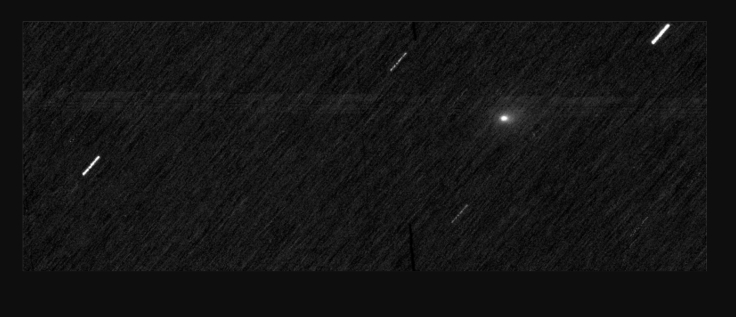Alleged 3I/ATLAS NASA Leak Shows Interstellar Body Is Emitting Strange Pulse Waves In Frequency Used By SETI To Search For Alien Life
Astronomers urge caution as viral claims about 3I/ATLAS spread online

A viral claim circulating online suggests that an alleged NASA leak has revealed an interstellar object, identified as 3I/ATLAS, emitting unusual pulse waves at 1,420 megahertz — the same frequency long used by the Search for Extraterrestrial Intelligence (SETI) to scan the skies for alien life. The story, fuelled by trending TikTok videos and speculative social media posts, has reignited public fascination with the possibility of intelligent communication from beyond our solar system.
The Alleged 3I/ATLAS Signal
3I/ATLAS, officially known as an interstellar object that entered the solar system after the famous 'Oumuamua, has been the focus of several recent astronomical studies. It drew attention again when claims emerged online that the object was sending structured radio pulse patterns detectable in the 1,420 MHz band.
The alleged frequency corresponds to the hydrogen line — a natural radio wavelength emitted by neutral hydrogen and often described as the universal channel for potential interstellar communication.
According to viral social media discussions, the reported pulses appear in a repeating numeric sequence described as 'unlike any natural emission pattern'.
One widely shared TikTok video claims the pulses are transmitted exactly at 1,420 MHz, noting that this frequency mirrors the one SETI has historically used to listen for extraterrestrial intelligence.
@eytan.beau New 3I Atlas update NASA will be releasing images data per Rep. Anna Paulina Luna!!! 🤯🚨 #3iatlas #nasa #ufo #alien #space ♬ original sound - eytan beau
The video amassed thousands of views and sparked widespread debate among astronomy enthusiasts, with many drawing parallels to earlier unexplained cosmic radio signals such as the 'Wow!' signal detected in 1977.
On the other hand, some users questioned the clip as no other news channel has reported the claim.
READ MORE: 3i/Atlas Avi Loeb Says 'We Are Screwed' If Interstellar Visitor Turns Out To Be Alien Spaceship
READ MORE: 3i/Atlas Vessel Footage Intensifies Alien Theories - Are Scientists Buying It?
What the Science Actually Shows
Despite the viral claims, no peer-reviewed research or official NASA confirmation has verified that 3I/ATLAS is emitting artificial or anomalous radio waves. The most recent scientific findings, reported by WIRED, show that astronomers using South Africa's MeerKAT radio telescope detected hydroxyl absorption lines at around 1,665 MHz and 1,667 MHz — both natural signatures associated with water molecules rather than communications.
The publication emphasised that there had been no confirmed radio transmission from the interstellar body beyond these absorption detections.
The SETI Institute has previously explained that while 1,420 MHz remains a critical listening frequency, it is also naturally active in the cosmos.
Numerous natural sources, such as hydrogen clouds, can emit or absorb energy in this band. As a result, scientists treat any unverified signal reports with caution until they are corroborated by multiple observatories and instruments.
How Social Media Amplified the Speculation
The supposed 'leak' appears to have gained traction after users on X (formerly Twitter) and TikTok reposted short clips showing radio wave visualisations alongside captions referencing a 'NASA internal recording'.
None of the posts, however, provided verifiable documentation or data. Some users also shared what they called a 'pulse sequence', a repeating numerical pattern that online communities described as a potential coded message.
The Significance of the 1,420 MHz Frequency
The 1,420 MHz band, known as the hydrogen line, has long been considered a prime candidate for interstellar communication due to its universality and minimal interference. SETI researchers have routinely monitored this frequency for decades in the hope that intelligent life elsewhere might use it as a cosmic standard for communication.
While the alleged 3I/ATLAS transmission has not been verified, its emergence on social media highlights how scientific speculation can quickly blend with public curiosity about the search for extraterrestrial life.
Experts continue to stress that extraordinary claims require extraordinary evidence — and for now, no evidence beyond online chatter has confirmed the existence of any artificial signals from 3I/ATLAS.
© Copyright IBTimes 2025. All rights reserved.



















